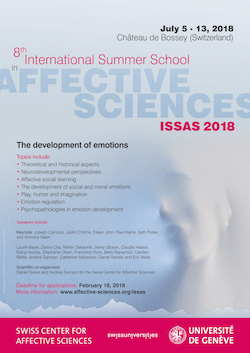ISSAS 2018
International Summer School in Affective Sciences (ISSAS)
The development of emotions
(July 5-13, 2018, Geneva, Switzerland)

Are you interested in attending the summer school? Apply here before February 18, 2018!
How do emotions develop? When does our affective life begin? What role do imagination, play and humor have in our affective education? How does a developing capacity for reason and reasoning shape our emotional repertoire and how we regulate our emotions? How does history contribute to our understanding of how our affective lives develop? What can we learn from literary depictions of individual and collective emotional trajectories? How should recent advances in neuroscience inform discussions of these themes? And what about individual differences? What can developmental disorders teach us about emotion development and how we learn from others?
During this summer school, internationally renowned scholars and PhD students from around the world from psychology, neuroscience, and the humanities will meet up to address such questions for eight days in a chateau overlooking the Alps and Lake Geneva.
While the main theme is “The development of emotions”, the summer school will be broken down into the following topics:
- Theoretical and historical aspects
- Neurodevelopmental perspectives
- Affective social learning
- The development of social and moral emotions
- Play, humor and imagination
- Emotion regulation
- Psychopathologies in emotion development
The responsibility for the scientific coordination of the 2018 edition of the ISSAS is shared between Dr Daniel Dukes and Prof Andrea Samson.
Daniel is a postdoc under the supervision of David Sander at the Swiss Center for Affective Sciences. His work currently focuses on affective social learning, emotion understanding, and the emotion of interest.
Andrea has her Ambizione Fellowship at the Swiss Center for Affective Sciences and is assistant professor at the Swiss Distance Learning University. Her work focuses on positive emotions and emotion regulation in clinical and non-clinical populations, as well as on developing trainings and games to increase emotional competences.
